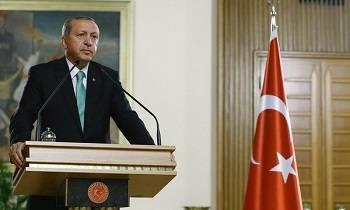A bill to change Turkey’s constitution and governing system has been submitted to parliament on Saturday.
Justice and Development [AK] Party's Group Deputy Chairman Mustafa Elitas submitted the bill to Parliament Speaker Ismail Kahraman with 316 signatures, total number of ruling party's seats.
The move came following an agreement struck with the opposition Nationalist Movement Party (MHP) on the draft amendments.
The government has long sought to replace the current parliamentary system with a presidential one, saying there are flaws in the setup which hold back Turkey’s development.
However, the ruling party does not have enough lawmakers alone to enact the proposal. The draft constitution needs at least 330 votes in a secret parliamentary ballot to pave the way for a referendum.
The Justice and Development (AK) Party has 316 seats while the MHP has 40 lawmakers; both parties back the bill.
The largest opposition group, the Republican People’s Party (CHP) remains opposed to the changes.
Teams from both the AK Party and MHP have carried out detailed work on disputed areas in the draft. Binali Yildirim, who is also the AK Party leader, has repeatedly met MHP head Devlet Bahceli on the issue.
Bahceli said on Monday the meetings had been "positive" and said a draft bill on the new constitution would soon be sent to parliament.
Despite the public having not seen the draft text, some media outlets claimed the two parties’ debates focused on three main issues.
These were: the authority of the current president until 2019; the limits of presidential decrees; and the quorum required to take the president to the Supreme Council for prosecution.
"The proposal, of course, will be a text that the MHP agrees upon or one that has been negotiated and agreed on,” Yildirim said recently, adding that a referendum to endorse the bill would be possible by early next summer "if everything goes well".
Before that stage, the proposal must be presented at the Turkish Parliament's General Assembly after approval by the Constitutional Committee. The constitutional amendment would then be discussed at two parliamentary sessions of the General Assembly.
During the first session, the four political parties in the assembly and the government would discuss the proposal as a whole and the articles separately, as well as any motions for amendment. The second session would be devoted only to the discussion of motions for amendment of articles.
If the draft constitution gets more than 367 votes, it can pass directly without the need for a referendum. However, the AK Party has said it will hold a referendum, even if none is needed.
If two-thirds of parliament (367) approve the bill, the president can take it to a referendum; that vote would be held within 60 days.
President Recep Tayyip Erdogan emphasized that he will push for a referendum even if the draft is approved by a two-thirds majority in parliament.
The change to the constitution requires a 50 percent vote in favor in a referendum.
Constitutional change -- in particular, the call for a presidential system -- has been on the political agenda since Erdogan, the former prime minister and AK Party leader, was elected Turkey's president in August 2014.
That election was the first time a Turkish president was directly chosen by popular vote.
In the current parliamentary model, Turkish people vote for 550 members of parliament. The government is formed by minimum number of 276 lawmakers.
In the proposed presidential system, the electorate would vote for a person to form a government independently of parliament, with no need of a vote of confidence.
PHOTO CAPTION
Turkish President Recep Tayyip Erdogan
AA


 Home
Home Discover Islam
Discover Islam Quran Recitations
Quran Recitations Lectures
Lectures
 Fatwa
Fatwa Articles
Articles Fiqh
Fiqh E-Books
E-Books Boys & Girls
Boys & Girls  Ramadan
Ramadan Fatwa Audios
Fatwa Audios Month of Mercy
Month of Mercy Women
Women Eed Al- Fitr
Eed Al- Fitr Food Recipes
Food Recipes Videos
Videos

 Prayer Times
Prayer Times












